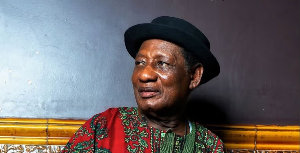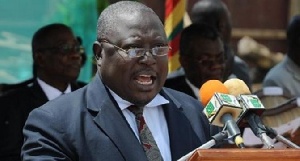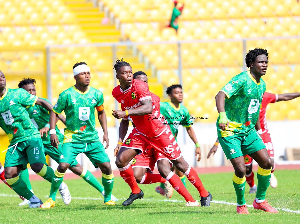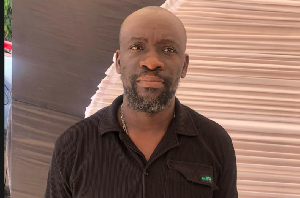A former Attorney-General and Minister of Justice, Martin Amidu, has stated that the decision by embattled businessman Alfred Agbesi Woyome to resort to the African Court on Human and Peoples’ Rights (ACHPR) is a clever trick by the businessman to “eliminate” him (Mr Amidu) – as the initial plaintiff – in the case he filed at Ghana’s Supreme Court against him.
Mr. Woyome proceeded to the African Court on Human and Peoples’ Rights in August 2017, when government began a valuation of his properties in an attempt to retrieve Ghc51 million wrongfully paid to him in a judgement debt.
The 11-member panel of the ACHPR recently ruled that: “The court finds that the situation raised in the present application is of extreme gravity and urgency on the basis that should the applicant’s property be attached and sold to recover the 51, 283, 480.59 the applicant would suffer irreparable harm if the application on the merits is decided in his favour…”
Mr. Woyome was paid the GHc 51 million after claiming he helped Ghana raise funds to construct stadia for the hosting of the 2008 African Cup of Nations.
However, an Auditor General’s report released in 2010, held that the amount was paid illegally to him Subsequently, the Supreme Court in 2014 ordered Mr. Woyome to pay back the money, after Martin Amidu, a private legal practitioner challenged the legality of the payments.
Following delays in retrieving the money, Supreme Court judges unanimously granted the Attorney General clearance to execute the court’s judgment, ordering Mr. Woyome to refund the cash to the state.
There had been previous attempts to orally examine Mr. Woyome, with Mr. Amidu himself, in 2016, filing an application at the Supreme Court to find out how the businessman was going to pay back the money.
This came after the Attorney General’s office under the Mahama Administration, led by the former Minister for Justice, Marietta Brew Appiah-Oppong, discontinued a similar application.
In February 2017 however, Mr. Amidu withdrew his suit seeking an oral examination, explaining that the change of government and the assurance by the new Attorney General to retrieve all judgment debts wrongfully paid to individuals, had given him renewed confidence in the system.
However, in an article, Mr Amidu said as far as the case he filed against Mr Woyome is concerned, “Until execution is completed, I am still the plaintiff and the case continues to be a civil case between two private citizens – Woyome and me; each with fundamental human rights under the 1992 Constitution and the African Charter.
“The Government of Ghana which was a defendant in the substantive civil case between Woyome and me cannot speak for me in any forum, including any appeal to the African Court on the substantive case. The Government of Ghana purporting to speak for me as a defendant at the African Court will be tantamount to the two defendants in the civil case in the Supreme Court using a stratagem to become opposing parties in the Africa Court to compromise the judgment legally obtained by me in the Supreme Court as a private citizen.”
“The African Court which is a court of human rights cannot uphold Woyome’s human rights without hearing me because both Woyome and I had access to justice under the 1992 Constitution when we both appeared and conducted our cases before the Supreme Court of Ghana. Nothing would be a worse breach of fundamental human rights than the African Court substituting the Attorney General or the Republic of Ghana as the plaintiff in the case in Ghana’s Supreme Court and proceeding with a determination of the case without hearing me as the substantive plaintiff in the case in Ghana’s Supreme Court. It would be an even further worse breach of fundamental human rights if the substantive plaintiff whose case is allegedly on appeal to the African Court, is not heard.”
THE AFRICAN COURT AND WOYOME DEAL WITH A PURELY CIVIL CASE AND EXCLUDE THE BENEFICIARY PLAINTIFF: BY MARTIN A. B. K. AMIDU
I have read press reports of a case commenced by Alfred Agbesi Woyome at the Africa Court on Human and People’s Rights alleging violations of his fundamental human rights in the execution of the judgment in the case of Amidu (No. 3) v Attorney-General, Waterville Holding (BVI) Ltd & Woyome (No. 2) [2013-2014] 1 SCGLR 606 and interim orders made by the Africa Court on 24th November 2017 suspending the execution of the judgment.
The problem with Woyome’s case at the African Court is that substantially, the impression I get is that Woyome’s case is in the nature of an appeal against a judgment and orders I obtained in the Supreme Court in that case, in which I was the plaintiff in my capacity as a private citizen of Ghana pursuant to Article 2 of the 1992 Constitution and Woyome was the defendant in his private capacity as a citizen of Ghana. The Government of Ghana represented by the Attorney General was also a nominal defendant in the case.
The case between me, as plaintiff, against the Attorney General and Woyome was a purely civil constitutional case and not a criminal case. The fact that the Supreme Court granted leave to the Republic of Ghana represented by the Attorney General to execute my judgment for the benefit of the public does not turn the case into a civil action between the Republic of Ghana against Woyome or a criminal case against Woyome.
Until execution is completed I am still the plaintiff and the case continues to be a civil case between two private citizens, Woyome and me, each with fundamental human rights under the 1992 Constitution and the African Charter. The Government of Ghana which was a defendant in the substantive civil case between Woyome and me cannot speak for me in any forum, including any appeal to the African Court on the substantive case. The Government of Ghana purporting to speak for me as a defendant at the Africa Court will be tantamount to the two defendants in the civil case in the Supreme Court using a stratagem to become opposing parties in the Africa Court to compromise the judgment legally obtained by me in the Supreme Court as a private citizen.
The African Court which is a court of human rights cannot uphold Woyome’s human rights without hearing me because both Woyome and I had access to justice under the 1992 Constitution when we both appeared and conducted our cases before the Supreme Court of Ghana. Nothing would be a worse breach of fundamental human rights than the African Court substituting the Attorney General or the Republic of Ghana as the plaintiff in the case in Ghana’s Supreme Court and proceeding with a determination of the case without hearing me as the substantive plaintiff in the case in Ghana’s Supreme Court. It would be an even further worse breach of fundamental human rights if the substantive plaintiff whose case is allegedly on appeal to the African Court, is not heard.
But the catch is that the African Court does not have the jurisdiction to hear appeals or applications in purely civil cases between a private citizen and another private citizen in which the Republic was also a defendant with the defending private citizen. It is to avoid such lack of jurisdiction by the Africa Court that Woyome chose to bring his application at the Africa Court against the Republic which was his co-defendant in the substantive case in the Supreme Court instead of me, in the hope that the case will not be properly argued by his former co-defendant. Ghana then loses the benefit of the judgment I obtained at the Supreme Court with the excuse that the decision was given at the African Court. It is nobody’s fault. Blame the African Court.
The African Court has no obligation to independently find out the facts apart from those presented by Woyome and his co-defendant now turned defendant at the Africa Court. Because I am a private citizen and plaintiff in the case and therefore not directly amenable to the jurisdiction of the African Court, the case will be heard and completed without me having the opportunity to defend my hard won judgment, before the African Court.
It may surprise Ghanaians that I, the substantive plaintiff in the case, have not seen or been served with any of the processes filed by Woyome at the African Court or any responses by the Government to date. I read about it in the media just as everybody else. But cases are won or lost based on how they are conducted to bring the salient facts and the law clearly before the justices and make one’s case. This implies hard work, thoroughly understanding the case, and above all unshakable commitment to the case. Who can thoroughly understand, and be more unshakably committed to a case than the plaintiff who won the case in the Supreme Court as against lawyers who lost it in the Supreme Court and who turn around to usurp the plaintiff’s place at an international tribunal as defendants even without the plaintiff’s notice? This does not appear to be the first case in which such lack of transparency and accountability will happen. Of course there is a lot of money to be made in per diems and other allowances representing the Government at international fora even when one loses the case!
For me the crux of the case before the African Court is whether the African Court has jurisdiction to hear a purely civil case between a private citizen, Amidu, against the Republic as a nominal defendant and another private citizen called Woyome, by admitting Woyome as the applicant and substituting the Republic as the defendant before the African Court. I won a good case for Ghanaians when the then-Government of the day supported Woyome and subsequently refused to execute the judgment sincerely.
The paradox will come when through Woyome’s present scheme of using the side door to eliminate me from the case at the Africa Court he procures sweet victory under the regime of President Nana Akufo Addo. Woyome’s mentors with whom he is waging this clever stratagem are waiting in the wings for that day to come. Let’s see who bears the blame for compromising or losing the case by usurping the position of the plaintiff without even the courtesy of a notice.
Martin A. B. K. Amidu
29th November 2017
General News of Thursday, 30 November 2017
Source: starrfmonline.com
GHS51m Saga: Woyome cleverly trying to eliminate me – Amidu
Entertainment












